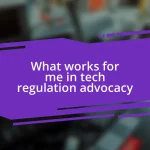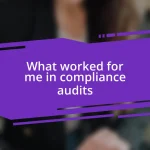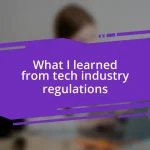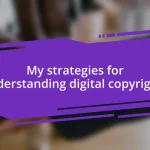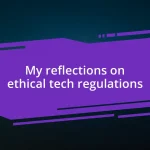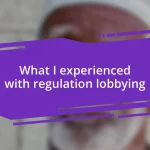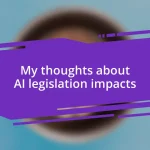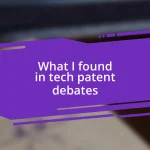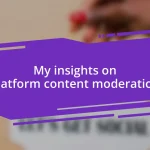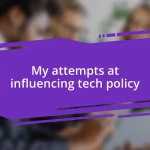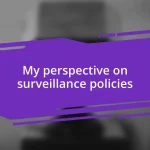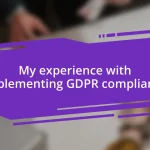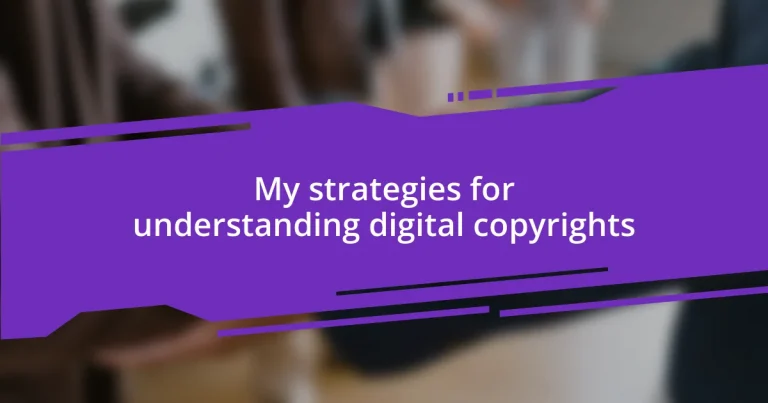Key takeaways:
- Original content is automatically protected by copyright upon creation, emphasizing the need for creators to understand their rights.
- Knowledge of specific laws like the DMCA and the Berne Convention is crucial for navigating challenges related to digital copyright and infringement.
- Effective strategies for protecting content include digital watermarking, registering work with copyright offices, and maintaining detailed records of the creative process.
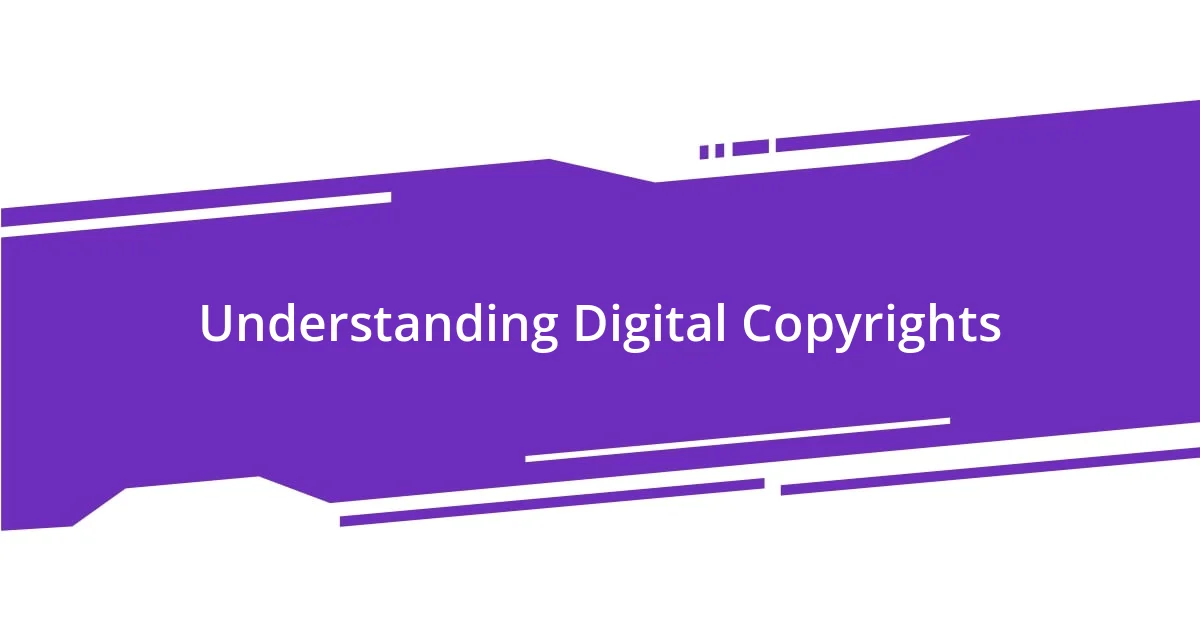
Understanding Digital Copyrights
Understanding digital copyrights can feel overwhelming, especially if you’re new to the concept. I remember the first time I published a piece online and felt a mix of excitement and anxiety about whether I was violating someone else’s rights unknowingly. Have you ever found yourself worrying about where to draw the line between inspiration and infringement?
One key aspect of digital copyrights is recognizing that your original content is automatically protected as soon as you create it. This realization brought me a sigh of relief, but it also left me questioning how to best safeguard my work. Could I really trust legal protections, or would I always have to be on guard?
As I dove deeper into the complexities of copyright law, I discovered that licensing plays a crucial role, too. I found myself pondering, how can I share my creativity without losing ownership? Learning about Creative Commons licenses was a game-changer for me, offering a pathway to share while also retaining rights. It’s liberating to know I can allow others to use my work under specific conditions while still keeping my creative integrity intact.
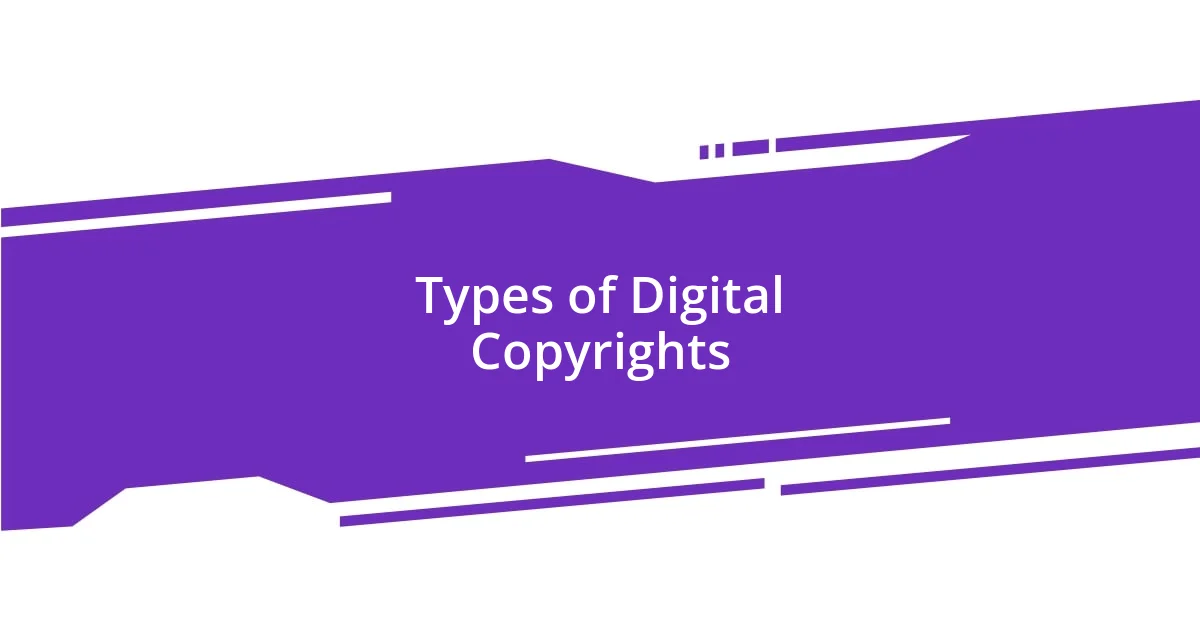
Types of Digital Copyrights
When it comes to understanding the types of digital copyrights, there are a few categories that stand out. Each type serves different purposes and has its own implications. I remember when I first learned about these distinctions—it felt like unlocking a treasure chest of knowledge that would safeguard my creative endeavors.
Here are some key types of digital copyrights to consider:
- Copyright: This protects original works of authorship, including literature, music, and art, as soon as they are created. I felt a wave of empowerment realizing my blog posts were automatically protected just by hitting “publish.”
- Trademark: This safeguards brand names and logos used in commerce. I found this particularly interesting because it means that creative businesses must protect their identity as much as their content.
- Patent: While often associated with inventions, software can also be patented. Understanding this was eye-opening; it reminded me how innovation in the digital space often requires different legal protection strategies.
- Creative Commons: These licenses enable creators to share their work while retaining certain rights. When I discovered this, it shifted my perspective on collaboration and sharing; I felt I could finally engage with others without the nagging fear of losing my rights.
Navigating these types of digital copyrights can feel both daunting and exhilarating, but knowing the distinctions empowers us to protect our creative identities while engaging with the digital world responsibly.
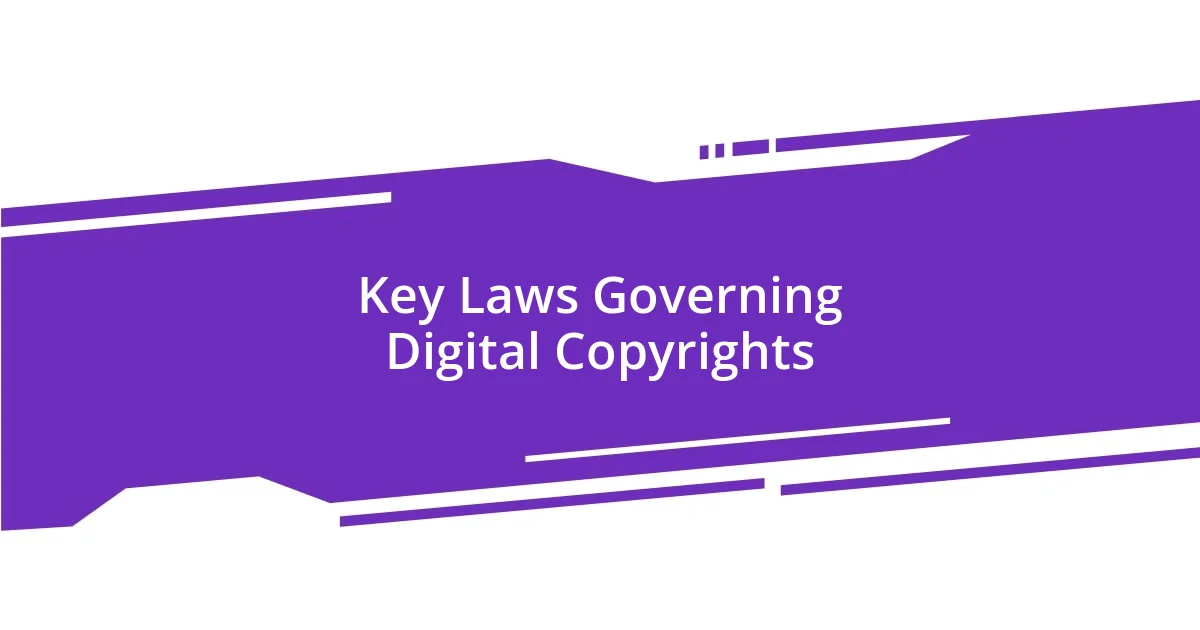
Key Laws Governing Digital Copyrights
The landscape of digital copyrights is primarily shaped by a few foundational laws. The Berne Convention, for example, establishes that works are protected without the need for registration, which honestly gave me a sense of security when I learned this. It felt liberating to know that as soon as I created something, it was protected just by being original. Understanding this law helped me appreciate the international dimension of copyrighting, as it applies to many countries around the globe.
Another significant piece is the Digital Millennium Copyright Act (DMCA). This law specifically addresses the challenges posed by the internet, including the issues of online piracy and copyright infringement. When I first encountered the word “fair use,” I remember feeling a mix of confusion and curiosity—what exactly qualifies? My ongoing exploration of the DMCA clarified that while users can share and comment on works under certain limits, the same freedoms don’t extend to unauthorized reproduction. It’s a tightrope walk that requires constant awareness and understanding.
Lastly, there’s the Copyright Act of 1976, which serves as the backbone of copyright law in the U.S. This law provides detailed definitions and protections for creators. It was enlightening for me to realize the scope of rights I hold over my creations—everything from reproduction to public performance. Contemplating this granted me a newfound respect for my work and the works of others. Realizing that buildings of legal language exist to preserve creativity compelled me to advocate for respectful use and awareness within my own community.
| Law | Description |
|---|---|
| Berne Convention | Ensures automatic protection for original works, applicable internationally. |
| Digital Millennium Copyright Act (DMCA) | Addresses online copyright issues, defines “fair use,” and helps combat piracy. |
| Copyright Act of 1976 | Establishes detailed protections and rights for creators in the U.S. |
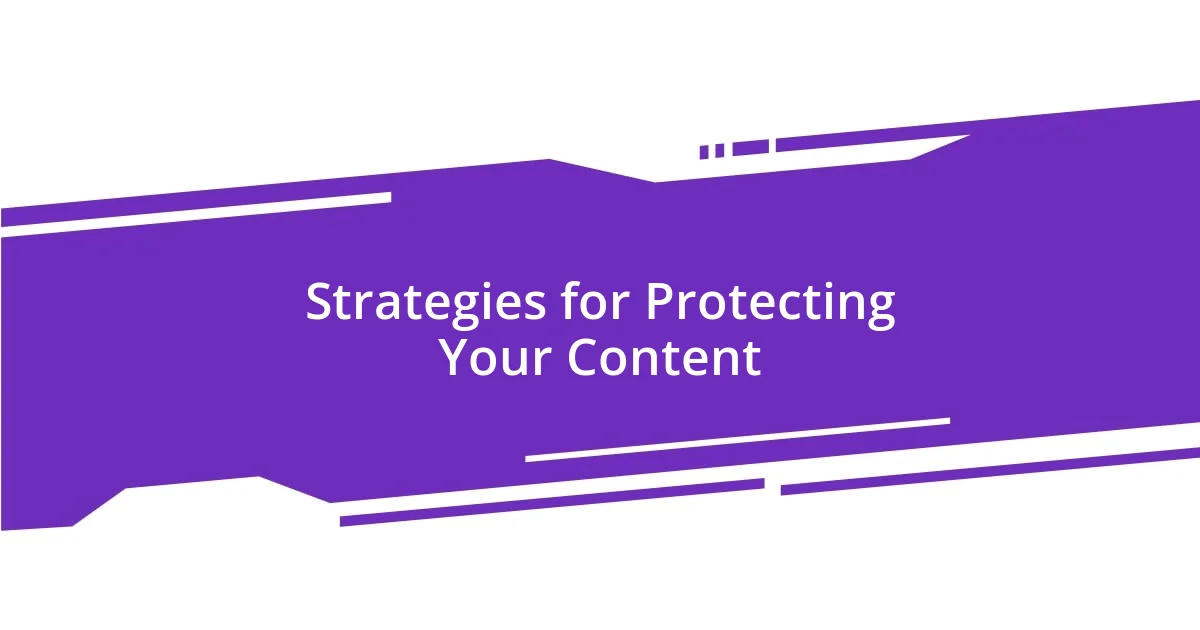
Strategies for Protecting Your Content
To protect your content effectively, employing digital watermarking can be quite beneficial. A watermark doesn’t just serve as a brand identifier; it acts as a visual deterrent against unauthorized use. I recall a moment when I found my photos splattered across social media without credit. The lesson? A simple watermark could have prevented that headache, reminding me of my ownership while simultaneously guiding viewers to my platform.
Another strategy I’ve found invaluable is registering my work with copyright offices. It might feel like an extra step, but it adds a layer of security and makes proving ownership much easier in case of disputes. You might wonder if that extra time is worth it. From my perspective, it is—especially knowing that I hold legal documentation that ties my name to my creations, turning a casual blog into something far more substantial.
Finally, keeping meticulous records of my creative process has proven to be a game changer. Documenting drafts, edits, and communications helps establish a timeline showing my evolution as a creator. It strikes me how often we overlook this but consider this: if someone were to challenge your ownership, having detailed proof of your work could mean the difference between a headache and a resolved conflict. I’ve learned the hard way that preparation pays off in the long run, giving me peace of mind to focus more on what I truly love: creating content.
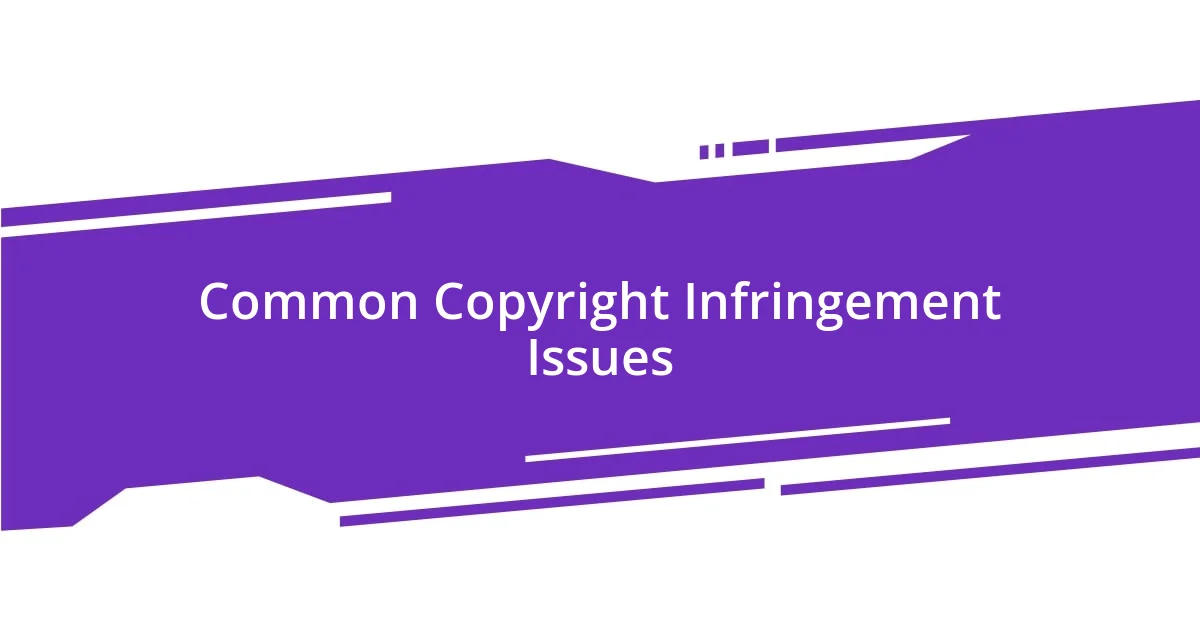
Common Copyright Infringement Issues
One common issue I’ve stumbled upon related to copyright infringement is the unintentional misuse of images online. I can recall a time I posted a blog featuring a stunning landscape photo I found on a free stock site, only to discover later that the image had strict usage restrictions. It made me realize that even content labeled as “free” can come with strings attached, emphasizing the importance of understanding licensing terms. Have you ever unwittingly shared something that wasn’t yours to share? It’s a learning moment that many face, especially as digital sharing becomes second nature.
Another prevalent infringement issue arises from social media misappropriation. A friend once had her creative artwork reshared by a popular influencer without proper credit, and she felt a mix of anger and helplessness. It’s a painful experience to see your work used as a tool for someone else’s gain, isn’t it? This brought to my attention that plagiarism isn’t always about direct copying; it can also manifest as a lack of attribution, something we need to be vigilant against in our digital interactions.
Lastly, the challenges of fan art can create a murky gray area. I’ve experienced the thrill of creating artwork based on my favorite shows, only to feel a pang of anxiety wondering if I’m crossing legal boundaries. While many creators appreciate fan expressions, it’s essential to recognize that copyright holders can enforce their rights, which puts fan artists in a precarious position. How do we balance our passion for fan creations while respecting original work? It’s a question worth pondering as we navigate this complex landscape.
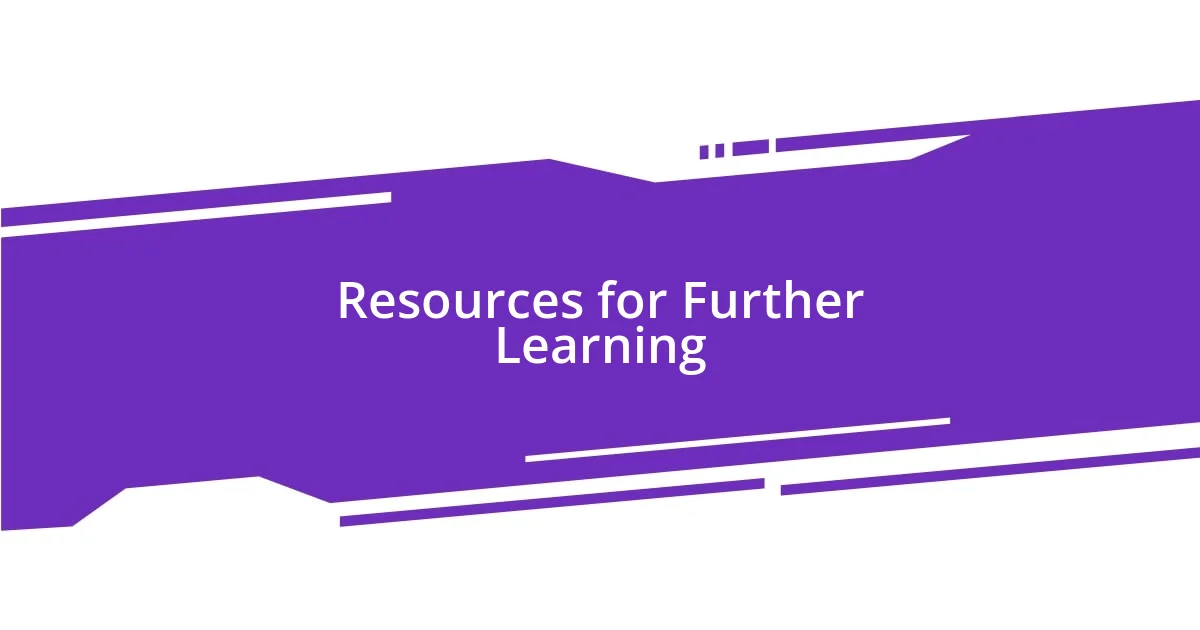
Resources for Further Learning
When diving deeper into digital copyrights, there are several valuable resources I’ve turned to over the years. Websites like the U.S. Copyright Office provide a wealth of information, including guides that break down copyright laws in understandable terms. I remember spending hours there, poring over their FAQs after feeling overwhelmed by what I thought might be a copyright violation on my blog. Have you ever felt lost in legal jargon? Their straightforward language made me feel empowered rather than baffled.
Books can also be invaluable tools for expanding one’s understanding of copyright. Titles like “Copyright Law in a Nutshell” by Arthur R. Miller clarify complex concepts and offer practical examples. I recall reading this book during a flight, and it shifted my perspective on how copyrights apply to different genres of creative work. It’s fascinating how one good resource can spark that lightbulb moment, don’t you think?
Lastly, online forums and communities, such as Reddit’s r/copyright, can be game-changers for real-time advice and experiences. When I faced a tricky situation regarding a music sample in one of my videos, I turned to the community for insights. The mixture of shared stories and expert advice helped me navigate my concerns and left me feeling less isolated. Engaging with others who are going through similar experiences not only broadens your knowledge but also makes you feel part of a supportive network.
